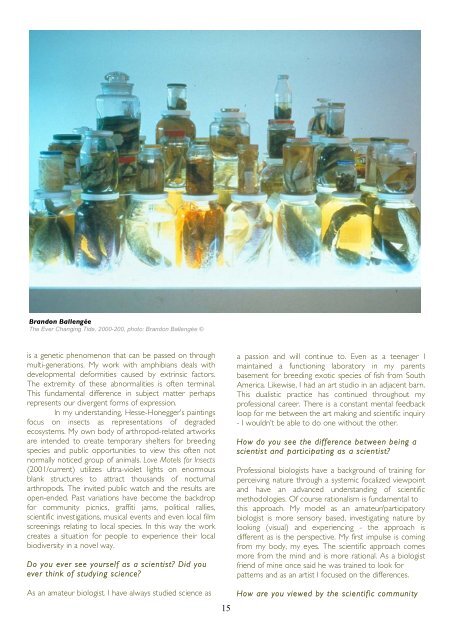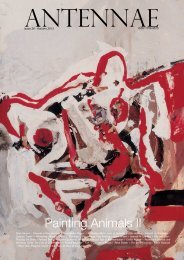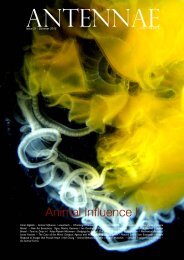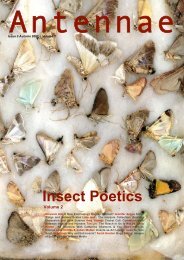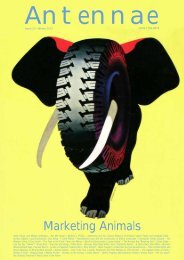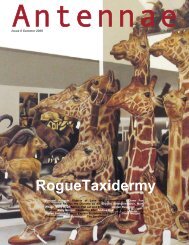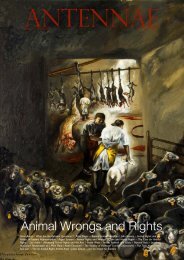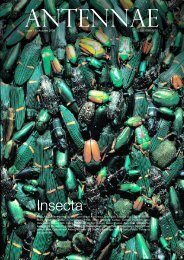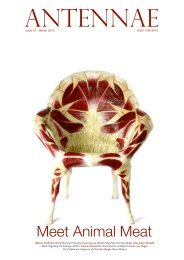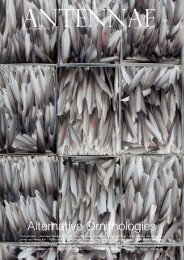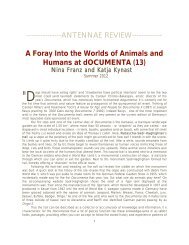M - Antennae The Journal of Nature in Visual Culture
M - Antennae The Journal of Nature in Visual Culture
M - Antennae The Journal of Nature in Visual Culture
Create successful ePaper yourself
Turn your PDF publications into a flip-book with our unique Google optimized e-Paper software.
Brandon Ballengée<br />
<strong>The</strong> Ever Chang<strong>in</strong>g Tide, 2000-200, photo: Brandon Ballengée �<br />
is a genetic phenomenon that can be passed on through<br />
multi-generations. My work with amphibians deals with<br />
developmental deformities caused by extr<strong>in</strong>sic factors.<br />
<strong>The</strong> extremity <strong>of</strong> these abnormalities is <strong>of</strong>ten term<strong>in</strong>al.<br />
This fundamental difference <strong>in</strong> subject matter perhaps<br />
represents our divergent forms <strong>of</strong> expression.<br />
In my understand<strong>in</strong>g, Hesse-Honegger’s pa<strong>in</strong>t<strong>in</strong>gs<br />
focus on <strong>in</strong>sects as representations <strong>of</strong> degraded<br />
ecosystems. My own body <strong>of</strong> arthropod-related artworks<br />
are <strong>in</strong>tended to create temporary shelters for breed<strong>in</strong>g<br />
species and public opportunities to view this <strong>of</strong>ten not<br />
normally noticed group <strong>of</strong> animals. Love Motels for Insects<br />
(2001/current) utilizes ultra-violet lights on enormous<br />
blank structures to attract thousands <strong>of</strong> nocturnal<br />
arthropods. <strong>The</strong> <strong>in</strong>vited public watch and the results are<br />
open-ended. Past variations have become the backdrop<br />
for community picnics, graffiti jams, political rallies,<br />
scientific <strong>in</strong>vestigations, musical events and even local film<br />
screen<strong>in</strong>gs relat<strong>in</strong>g to local species. In this way the work<br />
creates a situation for people to experience their local<br />
biodiversity <strong>in</strong> a novel way.<br />
Do you ever see yourself as a scientist? Did you<br />
ever th<strong>in</strong>k <strong>of</strong> study<strong>in</strong>g science?<br />
As an amateur biologist. I have always studied science as<br />
15<br />
a passion and will cont<strong>in</strong>ue to. Even as a teenager I<br />
ma<strong>in</strong>ta<strong>in</strong>ed a function<strong>in</strong>g laboratory <strong>in</strong> my parents<br />
basement for breed<strong>in</strong>g exotic species <strong>of</strong> fish from South<br />
America. Likewise, I had an art studio <strong>in</strong> an adjacent barn.<br />
This dualistic practice has cont<strong>in</strong>ued throughout my<br />
pr<strong>of</strong>essional career. <strong>The</strong>re is a constant mental feedback<br />
loop for me between the art mak<strong>in</strong>g and scientific <strong>in</strong>quiry<br />
- I wouldn’t be able to do one without the other.<br />
How do you see the difference between be<strong>in</strong>g a<br />
scientist and participat<strong>in</strong>g as a scientist?<br />
Pr<strong>of</strong>essional biologists have a background <strong>of</strong> tra<strong>in</strong><strong>in</strong>g for<br />
perceiv<strong>in</strong>g nature through a systemic focalized viewpo<strong>in</strong>t<br />
and have an advanced understand<strong>in</strong>g <strong>of</strong> scientific<br />
methodologies. Of course rationalism is fundamental to<br />
this approach. My model as an amateur/participatory<br />
biologist is more sensory based, <strong>in</strong>vestigat<strong>in</strong>g nature by<br />
look<strong>in</strong>g (visual) and experienc<strong>in</strong>g - the approach is<br />
different as is the perspective. My first impulse is com<strong>in</strong>g<br />
from my body, my eyes. <strong>The</strong> scientific approach comes<br />
more from the m<strong>in</strong>d and is more rational. As a biologist<br />
friend <strong>of</strong> m<strong>in</strong>e once said he was tra<strong>in</strong>ed to look for<br />
patterns and as an artist I focused on the differences.<br />
How are you viewed by the scientific community


